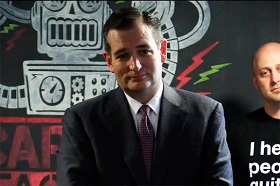Cyber Tuesday: Waiting for Virtual Revelation? Reviewing the cybersecurity agendas of US presidential contenders
This year is going to be the hottest for the US domestic politics in the several past years, with pundits quite reasonably engulfed in analyzing the political and economic aspects of the platforms offered by the challengers aspiring to take up the top position in the hierarchy of the global leader. Meanwhile, cybersecurity still seems to remain on the backburner. There is hardly a need to overstate the significance of this issue, but the information space and the Internet are effectively rushing into the geopolitical context, which definitely brings to the forefront the cybersecurity positions of the contenders for the presidency in the United States of America, the pioneer in advancing the information technologies.
During the expiring tenure, Barack Obama and his fellow Democrats have become known as ardent champions of stricter cybersecurity measures, close private-public cooperation in development of innovation technologies, and a formidable leap in the defense-related cyber agenda. In May 2009, Obama publicly qualified cybersecurity as his administration's mission of top priority but the final stretch of his presidency has brought up slightly different results. Protection of the information space, elaboration of the code of behavior and less espionage have really become an intrinsic feature of American political life during the past eight years, although hardly in view of breakthrough solutions or international agreements on behavior of state and non-state actors. On the contrary, Obama's term has become famous for such momentous developments as the relatively successful launch of the Stuxnet worm in 2011 [1], the Edward Snowden outrage that has shown the scale of US electronic surveillance, and an abrupt deterioration of relations with China because of numerous cases of two-way industrial espionage. The world is still to define the countermeasures for the Islamic State propaganda in the Internet. The immense failures in the information policy and cyberspace protection seem to provide good reasons to elevate cybersecurity to the independent tier of the US domestic and foreign political endeavors. Relations with other countries, especially with Russia and China, in handling cybersecurity matters have grown into geopolitical confrontation on par with the classical practices of the 20th century. To a lesser extent this approach can be applied to the US relations with the European Union, primarily with Germany and France. Hence, Mr. Obama's political legacy appears somewhat uncertain, although not totally discouraging.
The errors of the outgoing administration seem to have highlighted the problems that require fresh and tailor-made decisions and shoulder-to-shoulder cooperation of the government and private sector. No doubt, a sensible future administration has a chance to show a good example to all other leaders of the global community.
Hardly of uppermost significance for the outcome of the presidential race, the contenders’ approaches to cybersecurity issues by all means deserve some examination.
Hillary Clinton
In view of hacking and cyber attacks launched by the Russian, Chinese and other actors, under Ms. Clinton the Foggy Bottom must have seen its worst days. However, the former Secretary of State prefers to shun the cybersecurity matters and fails to place them in a separate section of her program in contrast to other contestants. Even her official website fails to place them in a separate cluster, just making a link to the American-Chinese relations, better protection of the critical infrastructure and measures against hacking. She also attaches future US-China relations to a healthier information space. Back in July 2015, Ms. Clinton vehemently condemned Chinese spying against American companies and the historic break-in into the database of the Office of Personnel Management (OPM).
Following Mr. Obama's policies, to a great extent shaped by numerous failures in winning the trust of the Silicon Valley majors, Ms. Clinton proffers closer public-private cooperation in the cyber dimension, as well as stricter regulation of the content because of the Islamic extremist threat emanating mostly from the Islamic State.
In her opinion, joint counteraction opens a way for Washington and the Silicon Valley to place their dialogue on a friendlier ground.
Bernie Sanders
Senator Bernie Sanders of Vermont, the other Democratic runner, seems to be more thoughtful, at least his website contains a cybersecurity section. Offering no detailed answers, Mr. Sanders accentuates economic damage from cyber attacks and hacker breeches of the critical infrastructure. At that, he employs the relevant documents adopted under the Obama presidency, which might point to his intentions to follow suit should he win, of course with proper adjustments for committed errors. The Vermont senator seems to share the defensive approach of Mr. Obama during the two past years due to the snowballing attacks against American corporations and government entities, among them the OPM database affair.
The Sanders campaign appears willing to raise the painful issue of security vs. privacy. Although he refers to the constitutional right of citizens for inviolable privacy, the Americans are likely to sacrifice it for personal and national security in the future as well. Quite different seems the situation if Mr. Sanders occupies the Oval Office and tries to find a reasonable balance between privacy and protection of national borders and citizens. He may hardly get a chance to handle things on his own.
* * *
As far as the Republican contenders are concerned, it seems proper to review the platforms of Jeb Bush (although a dropout at the moment), Ted Cruz and Donald Trump.
Jeb Bush
During his 2000-2008 tenure, George Bush Jr. practically neglected the cybersecurity issues, while his brother Jeb, formerly the Florida governor, in 2016 became visible during his short-lived run for linking cybersecurity and national security with a detailed examination of all domestic and external aspects. Back in his central statement of June 2015, he suggested making cybersecurity a priority matter for the incoming administration, and in September he was the first to make public specific proposals in this sphere.
Just like his opponents, Mr. Bush proceeded from the damage inflicted by cyber attacks and hacking, as well as the need to unite the government and businesses through exchanges in information and proven practices. He gave special attention to development and adoption of legislation for administration of justice and punishment of the wrongdoers operating in the cyberspace, as well as to making the actions of the federal government and relevant agencies more transparent and clear for citizens. Otherwise, cybersecurity would definitely remain an imperceptible black hole for a common Internet user. Mr. Bush wanted not only appropriate federal laws but also close international cooperation in legislating the cybersecurity dimension and establishment of an anti-hacking mechanism. Quite innovative appears to have been his proposal to invite immigrants for training in the information security professions and give them a chance to stay in the USA, thus filling the nation's demand for cybersecurity experts.
Notably, the United States is frequently accused of monopolizing the Internet by acquisition of the domain names. To this end, Mr. Bush suggested a detailed discussion on transferring the functions of the Internet Corporation for Assigned Names and Numbers and the Internet Assigned Numbers Authority, the question that has been in the limelight for several years. The decision was to be taken back in September 2015 but was yet again postponed. So, leaving the distribution of names as the prerogative of the Department of Commerce is likely to hurt a future president because of the expected avalanche of international criticism.
At that, Mr. Bush was repeatedly accused of trailing in the wake of Mr. Obama’s policies. However, this program is definitely the most advanced in the camp of the GOP contenders, which might imply that a possible Republican winner may take on his proposals.
Ted Cruz
Senator Ted Cruz, a maverick contender from Texas, suggests virtually nothing in particular on the Internet regulation and cyber security, while his odious statements during the campaign might point to his insufficient awareness. So far, it seems difficult to say whether it could turn into his worst campaign error.
He has also spoken adversely on the controversial but still fundamental principle of the global net operation, i.e. the “Internet neutrality” [2]. His statements do run against the words of Mr. Obama and democratic runners. At that, Mr. Cruz is trying to substantiate his approach by the desire to support the startup companies that are breaking through the dominance of the websites and numerous Internet providers. Nevertheless, the wish to help the beginners may hardly serve as a solid basis for giving up the net neutrality, and the contestant may have to adjust his views on cybersecurity and Internet regulation, should he stay in the race.
Donald Trump
Billionaire Donald Trump, a most successful American businessman and the most unconventional aspirant in the quest for the Oval Office, is convincingly employing his charisma and outspokenness to win the hearts and minds of the grass roots despite the lack of political experience. Although his victory next November may still seem ridiculous, it is at the same time risky to forecast the outcome.
Mr. Trump has so far failed to offer a clear-cut cybersecurity program, confining himself to several vague statements, which boil down to shutting down the Internet for countering the extremist threat and preventing the recruiting efforts of the Islamic State and similar groups. Thus, he is getting closer to Ms. Clinton and becomes open to the acute criticism of pundits and opponents. At the same time, their insistence on the inevitable need to impose restrictions in the information exchanges may be hardly qualified as totally ungrounded.
With the threat of terrorism on the rise, many come to thinking about effective instruments for virtual counteraction against the radicals and protection of the youths from their influences. At that, for the time being, there seems to be no other proper way other than curtailing the users’ liberty in the virtual dimension. But is there a path to make it effective with minimal damages? The issue is tremendously complicated and requires both tact and painstaking government efforts.
John Kasich, one more GOP hopeful, should be mentioned only in view of the continued work on strengthening cybersecurity and critical infrastructure of the United States, because his progress in the race is still insignificant, as one may see in his social media accounts.
* * *
On the whole, although the presidential hopefuls vary in their measure of interest to the protection and regulation of the Internet, cybersecurity and international cooperation in these areas, the virtual space issues seem hardly in focus of the current presidential campaign. The contenders expectedly take up topical themes of domestic and international significance that are rich in potential votes that may open the road to the White House.
At the same time, a future administration of any trait will inevitably face the problems related with protection and regulation of the cyberspace, which require thought-out and effective policies. Should the incoming POTUS display political will and wisdom, cybersecurity may provide a platform to bring together the United States, Russia and China for international cooperation, improvement of the economic macroclimate and, primarily, collaboration in countering the mushrooming virtual extremism.
As the oil prices keep falling, the need is arising for new sources of the economic growth, while in the coming 10-15 years the Internet and electronic commerce may as well turn into a potent and possibly the main driver of international trade and innovative progress, something the politicians should hardly neglect. At least strategy-wise.
1. Developed in 2010 by US and Israeli secret services, malicious computer worm Stuxnet was intended to attack the critical infrastructure of Iranian nuclear, although Washington would not officially admit its involvement.
2. Net neutrality is the principle of Internet operation that specifies equal treatment of providers and websites carrying legal information, with a ban on discriminatory preferences to certain network traffic.









